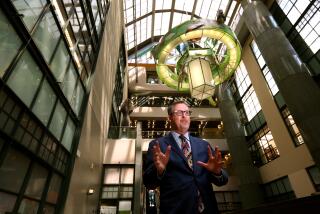Computers Save Footsteps, Put the Library at Your Fingertips
- Share via
Computers and the booming demand for information are changing one of the world’s most familiar institutions--the library.
Encyclopedias, newspapers and card catalogues are stored in computerized data bases, books are being “printed” on computer disks, and in some cities it is possible to use personal computers 24 hours a day to monitor a library’s card catalogue, so that a user can call the library and request that a book be mailed.
By the end of the decade, rapid laser printers are expected to make it technically possible and economically feasible to print in seconds the texts of entire books, according to Richard Sweeney, dean of libraries and information services at the Polytechnic Institute of New York.
‘Print Out a Book’
“If you can print out a book on demand, that’s obviously going to change bookstores and libraries,” Sweeney said.
Already, the proliferation of computer data bases is putting whole libraries at the fingertips of personal computer users. It is no longer necessary to comb book stacks to use the extensive information resources once found only at a large library.
“You don’t need a building full of books to be a library anymore,” said Barbara Quint, head of reference services at Rand Corp.’s library in Santa Monica. “With nothing more than a phone, a computer terminal and money, you can operate your own powerful research library.”
These are revolutionary times in the library world, a world historically impervious to radical change.
Previously, the most profound events in the history of libraries were the creation of written language and the invention of the printing press. The first development led to the first library in Alexandria--an ancient archive of handwritten scrolls available only to scholars of the day. The printing press made general public access to literature feasible through the relatively cheap reproduction of books and manuscripts.
“There’s no question that invention of the computer is in the same category,” said Rand’s Quint. She said the computer will make future libraries more efficient and information--”the memory of man”--more widely available.
“Easy access to more information is going to change the way humans solve problems,” Quint predicted. “People are learning that they don’t have to rely on getting their information from others, like doctors, for example. Computer technology allows everyone to do his own research.”
Sweeney, former executive director of public libraries in Columbus, Ohio, said libraries will continue to have a valuable social function beyond their research mission, however.
“A library is a warm, comfortable, intellectual place, and people will want to go there for a long time,” he said. “But that kind of library will be competing for funding with the modern, computerized libraries.”
Quint said high-tech libraries might actually be more economical despite the initial expense of extensive computerization.
“A lot of money that goes into libraries is spent on buildings and materials. It could be better spent on information, on helping people get answers,” she said, predicting that future libraries will be commonly regarded as “information centers.”
More to Read
Sign up for our Book Club newsletter
Get the latest news, events and more from the Los Angeles Times Book Club, and help us get L.A. reading and talking.
You may occasionally receive promotional content from the Los Angeles Times.








